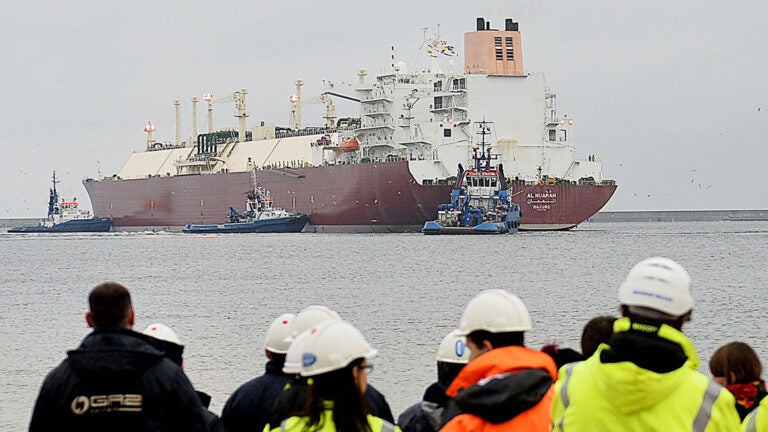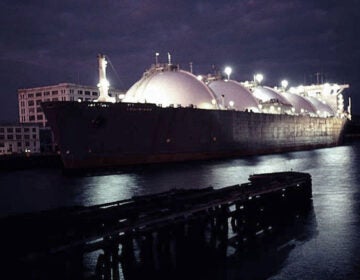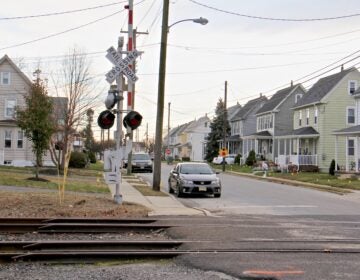N.J.’s first natural gas terminal for tanker ships may get final vote
The Delaware River project could spur more fracking, according to opponents who also warn of health hazards.

A tanker carrying the first delivery of liquefied natural gas arrives at at a newly-built LNG terminal in the Baltic port of Swinoujscie, Poland. (AP Photo/ Lukasz Szelemej)
This story originally appeared on NJ Spotlight.
___
Plans to build New Jersey’s first liquefied natural gas export terminal may get a final vote from the Delaware River Basin Commission this week, prompting a flurry of last-minute protests by opponents including environmentalists and public-health advocates.
The interstate water regulator has left open the possibility that its governing body will vote on whether to approve the construction of a dock for LNG tankers on the Delaware River at Gibbstown in Gloucester County, and dredging of the river, even though the matter is not on the formal agenda for the Sept. 10 business meeting.
“An action could occur, but it would be at the commissioners’ discretion,” said Kate Schmidt, a spokeswoman for the DRBC, referring to representatives of the governors of New Jersey, New York, Pennsylvania and Delaware plus the U.S. Army Corps of Engineers, which represents the federal government on the commission’s governing body.
The commission approved the project in June 2019 but then suspended its decision and agreed to hold a quasi-judicial hearing in May this year to hear the arguments of Delaware Riverkeeper Network (DRN), an environmental group, about why the dock should not be built.
DRN and other critics are urging the commission to reject a recommendation to approve from an officer who presided over the hearing when friends and foes made their arguments over the project.
The hearing officer, John Kelly, said in a report issued in July that he had heard no evidence to indicate that the commission should change its previous approval for the project, which would build a second dock for LNG tankers — “Dock 2” — at the planned Gibbstown Logistics Center. The center is being built on a former DuPont site where explosives were made.
Kelly said the evidence presented by Delaware Riverkeeper Network and its witnesses had failed to meet their burden of proving that the dock should not be built. “It is recommended that the Dock 2 Docket should remain as previously approved by the commission,” Kelly said in the 102-page report.
LNG would be loaded on ships for export
The dock is part of a plan by the developer, Delaware River Partners (DRP), to ship super-cooled natural gas as LNG from a new liquefaction plant at Wyalusing in Pennsylvania’s gas-rich Marcellus Shale region to Gibbstown where it would be loaded on to ships and exported.
The developer, an affiliate of Fortress Investment Group, a New York hedge fund, plans to carry the LNG to Gibbstown in trucks or rail cars, following the federal approval late last year of the nation’s first LNG-by-rail permit, which was specifically for the Wyalusing-Gibbstown route.
Critics say transportation of the highly explosive fuel through densely populated parts of Pennsylvania and New Jersey would endanger public safety and expose residents of some parts of South Jersey to round-the-clock truck and train traffic.
The export plan will also stimulate fracking in Pennsylvania’s gas-rich Marcellus Shale, encourage the emission of greenhouse gases, and create “floating bombs” in the form of LNG tankers, opponents say.
“The proposed Gibbstown LNG export terminal is fraught with danger at every step of its supply chain; from the fracking and liquefaction in northcentral Pennsylvania, to the dangerous transport of flammable and potentially explosive liquid methane … to the “floating bomb” ships that will take it overseas, to its end use as a dirty fossil fuel,” said Maya van Rossum, leader of Delaware Riverkeeper Network.
A group of physicians from New Jersey, New York and Pennsylvania also urged the commissioners to reverse their earlier approval. In a letter, they said that any spill of LNG can flash-freeze human flesh and cause asphyxiation by displacement of oxygen.
Physicians ‘deeply concerned’
“We are deeply concerned that no full quantitative risk assessment has been conducted to identify the likelihood and frequency of transportation-related accidents and consequences,” said the letter from Concerned Health Professionals of New York, and other physician groups.
If the commission affirms its approval of the project, construction could start as early as Sept. 15, when the U.S. Army Corps of Engineers is due to lift a six-month construction ban that was designed to protect two endangered species of fish.
The commission’s approval is the last one needed for the project; other permits from the Army Corps and the New Jersey Department of Environmental Protection have been issued although they are being appealed by Delaware Riverkeeper Network. Hearing officer Kelly noted that DRBC had never denied a permit for a project that has been approved by all other federal and state agencies.
Tracy Carluccio, deputy director of DRN, accused DRBC of seeking to avoid public input on the controversial project by excluding it from this week’s agenda.
“It is disgraceful that a public agency thinks they can operate so clandestinely, keeping information about such an important project from the public,” she said. “They also are not allowing any more public comment before the vote by doing it this way, which is another shutting out of public opinion. But they do it because they think they can.”
Last year, the environmental group accused the developer and several regulators of not giving the public enough information about plans to export LNG via Gibbstown.
The United States began exporting liquefied natural gas in early 2016 in response to a surge in domestic production caused by hydraulic fracking of shale reserves. Most export terminals are on the Gulf Coast but they also include one at Cove Point in Maryland.
Spokespeople for the governors of the four basin states did not respond to requests for comment on how the governors would vote if the LNG project comes before them this week.
New Fortress Energy, parent of Delaware River Partners, did not respond to a request for comment.
WHYY is your source for fact-based, in-depth journalism and information. As a nonprofit organization, we rely on financial support from readers like you. Please give today.






